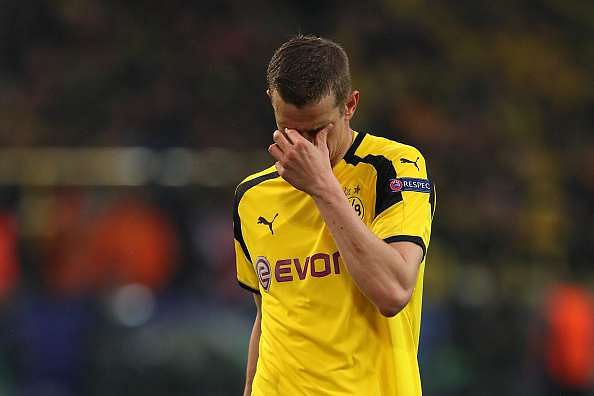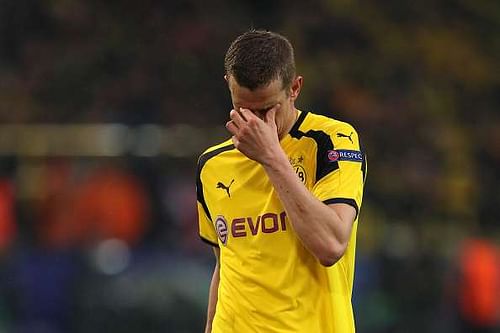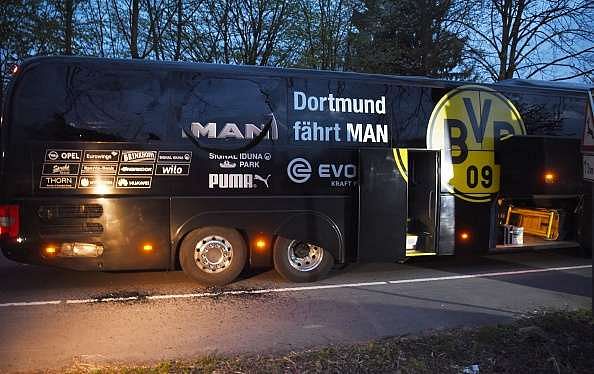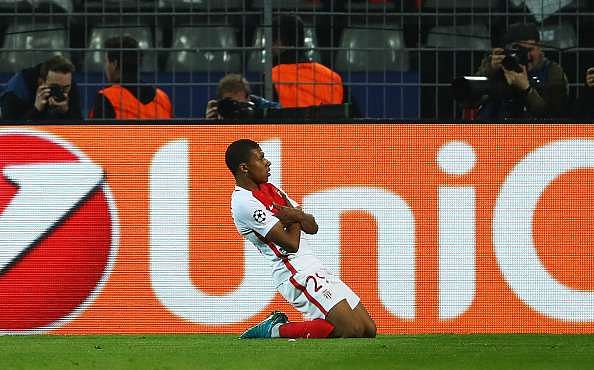
UEFA display shocking callousness as Dortmund are forced to play 24 hours after attack on team bus
“We were treated as if a beer can was thrown at the bus. It gives you a feeling of impotence.” – Borussia Dortmund coach Thomas Tuchel
A beer can thrown at the bus would have been more than welcome compared to the three explosions that rocked Dortmund – explosions that damaged the bus on its way to Signal Iduna Park and injured defender Marc Bartra. The Spanish defender was the only player to suffer an injury in the incident and had to undergo surgery on a broken wrist and remove debris from his arm.
Everyone remembers when Manchester United’s team bus was attacked on its way to West Ham’s Boleyn Ground in May last season. Videos from inside the bus were widely circulated and, while there was a hint of fear in the ranks as the bus’ windows held firm, there was also bemusement. Jesse Lingard clowning around in the chaos is an everlasting image.
But this was no beer can. This was a pre-planned explosion meant to cause significant harm rather than make rival players feel unwelcome by greeting them with a hostile atmosphere.
Following the initial confusion, it was the club that kept it together and tweeted relevant information to the fans. They assured fans at the stadium that they were in no immediate danger while asking them to remain calm and wait for an update on the game.
Soon, the update everyone was waiting for was tweeted 15 minutes before actual kickoff time: the match had been cancelled and postponed to Wednesday with an earlier kickoff time. The tickets bought would remain valid. Travelling Monaco fans also chanted “Dortmund! Dortmund!” and home fans reciprocated by offering them beds for the night.
Terrorism had been defeated as football stood defiantly in the face of misplaced religious extremism. Everyone moved on.
Or had they?
Dortmund vs Monaco was rescheduled with complete disregard for the players
After what was arguably the most intense and traumatic experience most players and staff had experienced in their lives, they were simply asked to get back to their job – play football. The very next day.
“We were informed by text message that UEFA was making this decision. We would have liked more time to take stock. This gives you the feeling of impotence, that we have to keep functioning and nothing else matters.” – Tuchel
In a congested football calendar, there was simply no other date to play this fixture – at least that is what UEFA thought of the whole situation. The fixture couldn’t be played on a weekend because both teams obviously had league commitments. What about next week? Oh no, the second leg of the quarter-final was scheduled for then. Tickets had already been sold.
Also read: Borussia Dortmund 2-3 AS Monaco – 5 Talking Points
Besides, both Dortmund and Monaco were scheduled to play in the semi-finals of the DFB-Pokal and Coupe de France the following week – and there was no chance they could delay it any further than that because the Champions League semi-finals had to be played soon after.
So UEFA did the next best thing and scheduled the game for Wednesday night. Did they even consider Thursday night at the very least or would that have made the Europa League a sideshow (it already is, UEFA!)? Surely both the Bundesliga and Ligue 1 would have allowed the teams to play their league games a day later so they had adequate time to recuperate?
“The decision to play the UEFA Champions League match between Borussia Dortmund and AS Monaco FC on Wednesday at 18.45 CET was made on Tuesday night at the BvB Stadion Dortmund in cooperation and complete agreement with clubs and authorities.
“UEFA was in touch with all parties on Wednesday and never received any information which suggested that any of the teams did not want to play.” – UEFA statement on the rescheduled fixture
UEFA washed their hands off the matter and put the onus on the clubs. Which begs the question: why weren’t the players consulted?
Defender Sokratis Papastathopoulos summed it up best when he attacked UEFA for scheduling the game the very next day without consulting the players and staff.
“They [UEFA] have to understand that we are not animals. We are people who have families, who have kids in the house. And we are not animals. I am happy that all the players are alive, and all the staff are alive.”
Dortmund suffered as football took a back seat
Anyone who watched the game would have immediately understood that the German side were simply not up for it. Less than 24 hours after the incident, there they were on the pitch with a depleted squad.
Tuchel couldn’t even name an 18-man squad. “We only had 15 players available in the squad,” he lamented after the game. “We would have wanted to have more time to digest all of this. We did not get this time.”
It wasn’t just Dortmund who were emotionally broken after the explosions. Monaco were also not in the right frame of mind following the attack on the bus. He admitted that the players’ concentration was not at the desired levels.
“I think that more than the result of this match, it is the situation that will remain in history.” Monaco coach Leonardo Jardim
Without Bartra, Dortmund had to force Sven Bender into the centre-back role. This was Bender’s third game of the season – he had last played 45 minutes in December. He lasted only 45 minutes on Wednesday night too as a poor outing highlighted by an own goal saw him taken off at half-time.
Monaco certainly looked the more focused team in the first half and the 2-0 lead was certainly well deserved. But Tuchel’s changes at half-time looked to have breathed some life into the game as the German side fought back.
But Kylian Mbappe capitalised on a weak Lukasz Piszczek pass to nick the ball and score when he was one-on-one with the keeper. It almost killed the tie but Dortmund’s resilience did see them get one back and almost find an equaliser in stoppage time as the match ended 3-2 in favour of Monaco.
“In the bus last night, I will never forget the faces all my life”
While the world rejoiced at the fact that football had kicked terrorism in the butt, it was only after the game that the truth dawned on everyone. In the post-match interview by Jan Aage Fjortoft, Dortmund’s Nuri Sahin was very honest and forthright when he was asked to describe the last 24 hours and what went on behind the scenes.
Sahin described how he had seen incidents like this unfold on TV – especially in his country Turkey where an Istanbul nightclub was attacked on New Years’ eve – and that he wouldn’t wish for this to happen to anyone.
But what he said soon after was what struck a chord with everyone watching.
“Until I was on the pitch in the second half I didn't think about football. I know we earn a lot of money, have a privileged life, but we are human beings and there is so much more than football in this world and last night we felt it.” – Sahin
That tells you the about the levels of concentration – or the lack of it – the Dortmund players had following the attack. As a player representing the club, they have a huge responsibility on their shoulders and one that is not easily shirked. As fans, we can easily take a decision on whether or not we go for a game. As a player, that is never an option.
Dortmund claimed the game was a sellout but that was a number based on the tickets sold. A look at the crowd from various camera angles showed a number of empty seats.
The quarter-final tie is still alive. But when football should have taken a backseat, the higher-ups’ decision saw convenience trump empathy. While standing up to terrorism in such a manner takes immense courage, a lack of compassion from those not directly involved leaves a nasty taste in the mouth.



